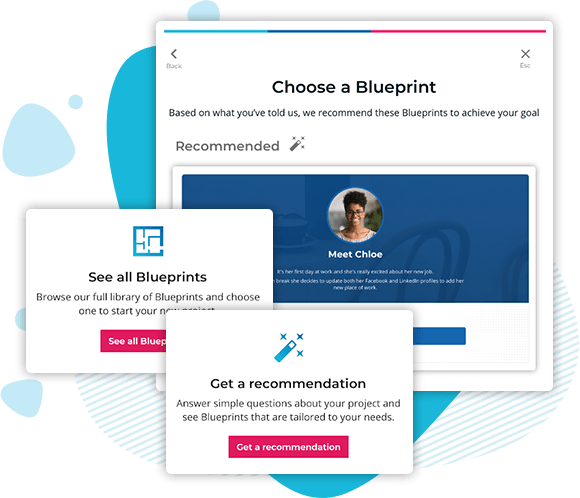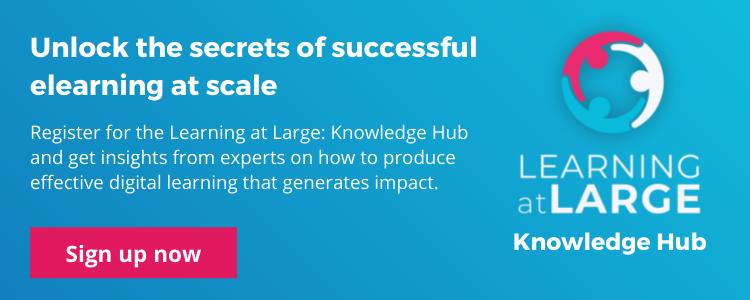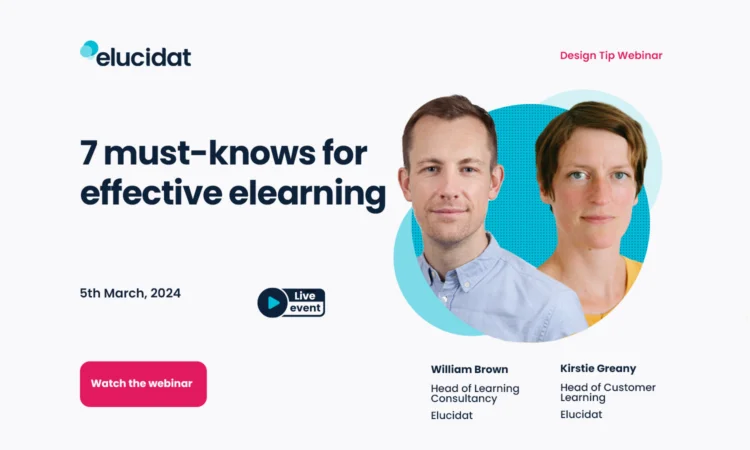How to transform the way you work with Subject Matter Experts (SMEs)
8 minute read
The Subject Matter Expert (SME) relationship can make or break an elearning project. As your gateway to the content, audience and organization, working with subject matter experts has the potential to either derail development or keep you on track and steaming towards the end goal.

First things first – what is a Subject Matter Expert in elearning?
An SME is a person who brings content expertise to your elearning project. Experts in their field, they’ll provide the raw subject matter that the elearning course will cover. This includes knowledge of the theory (such as processes and policies) as well as stories and anecdotes that bring the theory to life. Their role is key when you are creating an elearning course, from the early days of identifying learning objectives to refining and reviewing the content.
Where you’ll find an SME depends on the project – a health and safety course might see you calling on the head of compliance, while an onboarding module would involve the HR team’s input.
Remember, the SME role doesn’t have to stop at being simply the source of knowledge. With the right support on hand, SMEs are well placed to create elearning themselves, empowered to make design decisions and build high-quality courses.
Your role as an elearning course manager: Empower for excellence
As an instructional designer, learning consultant or elearning project manager, your job is to build a positive and productive relationship with your Subject Matter Expert. You need to get them onside, get the best from them, and get them working in partnership with you to create the best practice for elearning. The mistakes of old – seeing them as simply a resource, there to ‘knowledge dump’ or pick holes in your design – are long gone.
Savvy L&D teams are now looking to take the opportunity of working with subject matter experts even further – by empowering them to produce the training themselves.
At Elucidat we believe crowdsourcing elearning is the future – and SMEs are a key part of that vision. By positioning your L&D team as a center of excellence, rather than order takers, you can build a hub of organizational intelligence and effectiveness. With this approach, SMEs no longer simply feed their knowledge into a project for others to build; instead, the L&D team empower experts across the business to produce high-quality elearning themselves. This enables you to dramatically increase the volume of high-quality training materials that can be produced, in a fraction of the time.
This new way of thinking might bring with it some concerns:
- When letting multiple SMEs author content, how do you ensure consistency? Both visually and in terms of design approaches?
- How do you make sure novice authors produce the right level of quality?
But have no fear – we’ve got the practical tools and best practice tips you need to ensure your Subject Matter Experts hit the ground running.
Let’s explore how you can ensure you’re set up for success.
Top tips for working with Subject Matter Experts and empowering them to get involved
- Choose an authoring development tool that makes it quick and simple for novice authors to create high-quality elearning. Elucidat is designed to do just that, helping you crowdsource expertise from across your organization without risking quality. You can be confident in inviting SMEs to produce training directly in Elucidat with customizable user roles and permissions that provide you with flexibility and control, giving people access only to what they need.
- Plan the support you can offer your Subject Matter Experts to grow their confidence with authoring. Turn your L&D team into a center of excellence by building a library of helpful resources to get novice authors up to speed quickly. This could include visual and tone of voice guidelines, best practice examples, and flagship projects. You’re the experts when it comes to learning design – set standards and share what best practice means for your organization.
- Engage your SMEs from the beginning. Many Subject Matter Experts will be new to authoring content – some will be excited at the prospect of developing new skills, while others might be nervous about working with new technology. Empathize with how they’re feeling and discuss ways to put them at ease, such as the support that’s available from the L&D team, and the benefits of this development opportunity. But before you make a decision about their level of involvement, be sure to consider our next tip.
- Be respectful of their time and other commitments. Discuss the schedule with them, don’t just impose it on them, and talk about how and when to involve them in a way that works for both parties.
- You’re both experts in your field. The project needs both of you so discuss how to work collaboratively rather than authoritatively positioning yourself as the boss. Your role is to share best practices and empower them to get involved.
- You might have different views on how to get there, but you both want a successful project and effective end product. Define your shared goal and refer back to it often.
- If you have multiple Subject Matter Experts authoring content, encourage them to share their learnings and best practice with each other. As novice authors they’ll likely have similar questions, so creating a sharing culture will be really beneficial. As SMEs build their skills, find solutions and generate ideas, they can look to each other, as well as the L&D team, for support, sharing insights as a community.
- Once a few of your Subject Matter Experts have grown in confidence and proved they can create learning of the right quality, encourage peer reviews. With so many SMEs growing their authoring skills, they’ll be more than capable of advising on best practice collectively – freeing up time for the L&D team. If you choose a tool with a review process built-in, like Elucidat, this kind of collaborative approach won’t slow things down. SMEs can add comments straight into the tool so there’s no uncertainty about which bit they’re referring to, and authors can respond directly if discussion is needed. There’s no version control issue, and the time required for the back-and-forth to get feedback implemented is vastly reduced. Find out how Elucidat’s collaborative authoring platform can help you do more in less time.
- At the end of the project – or even after any big milestones – say thank you. A little appreciation for their time and effort goes a long way. They’ve not only grown their skills, they’ve helped shape a community of experts able to share their expertise, advice and learnings with novice authors throughout the business. Their help will go a long way to getting training out into the business as quickly as possible, at scale.
Use Learning Accelerator to help you empower novice SME authors
As mentioned above, collaboration with your Subject Matter Experts can make the design process more efficient, more enjoyable and ultimately more successful. If SMEs are involved and invested as the project evolves, you’re far less likely to run into problems later on. And with the right tools, support and processes in place, getting them building the content themselves sets you up for even greater success. To help you do this, we’ve created Learning Accelerator. It’s designed to help you alleviate those fears of consistency and quality, optimizing the SME author experience to invite more of them in and with quicker results.

With Learning Accelerator Subject Matter Experts won’t need to start a new project from scratch. Instead, an easy to use recommendation engine will point them in the direction of a template tailored to their needs. This template acts as a template, with a ready-made design approach baked in and guidance on how to make it work for your content.
There’s a template available to suit every kind of project, from in-depth process training and game-like quizzes to high level case studies and microlearning.
Starting from a template sets authors up for success from the outset. It increases confidence, whether it’s a novice author easing into creating simple projects, or an advanced author looking to take their designs even further.
Check out how to power up your online training capability to find out more.
Not in a place to have SMEs authoring content themselves just yet?
Not to worry. Here are some tips on how to best work with SMEs who are supporting elearning that your L&D team are building.
- When meeting your Subject Matter Expert, start with a blank screen, questions and conversation. This will yield more valuable information than your SME simply talking through their material.
- It’s up to you to elicit the right kind of information and stories to support your objectives. Draw out anecdotes, case studies and the nuances of the subject that aren’t in the reference books. The golden rule here is to respect what they do. Ask the SME about their career and experience, not just the subject. This builds rapport and gives you valuable stories that bring the content to life.
- Draft intelligent questions ahead of discussing the content with your Subject Matter Expert. Remember you’re well placed to anticipate questions the end learners might have so don’t be afraid to interrogate the content.
- Invite their contributions as you create storyboards and develop the product. Flag where expert feedback is needed and welcome their opinions on the design and visuals, too.
- If they resist some of your ideas, don’t dismiss their concerns. Try to understand why they are wedded to ‘the old way’ and then demonstrate the benefits of your approach.
Summary
Subject Matter Experts are all too often the unsung heroes of elearning development. With the right tools and processes in place, you can empower them to become fully competent authors, able to build confidently, share best practice, and create quality training, super fast. By harnessing their expertise and developing their skills in this way, you’ll see a collaborative relationship blossom that benefits the whole organization.
Want to learn more?
The first three Learning Accelerator templates are free and available to add to your Elucidat account now. Just visit our accelerator page and submit the form – your Account Manager will be in touch.
Don’t have an account? Book a demo today and take the new update for a test drive with a free trial!
You can also sign up to our 3 part webinar series, where you’ll learn how to crowdsource training production without the risk – start engaging your Subject Matter Experts like the teammates they are!




